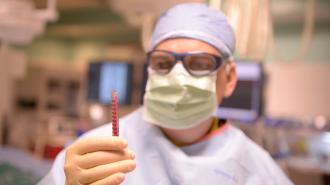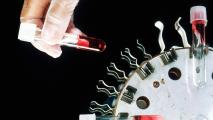This article is an installment of Future Explored, a weekly guide to world-changing technology. You can get stories like this one straight to your inbox every Thursday morning by subscribing here.
A new stem cell therapy slashes the risk of heart attacks and strokes in people with heart failure, cutting the rate by more than half — a discovery that could give doctors an entirely new way to treat heart failure.
“We’ve made an enormous step to be able to harness the real power of adult stem cells to treating the heart,” co-principal investigator Emerson Perin from the Texas Heart Institute told CNN. “This trial really is a signal of a new era.”
Heart failure 101: More than 6 million Americans live with chronic heart failure, a condition that occurs when the heart can’t pump as well as it should. This means the rest of the body isn’t getting as much oxygen as it needs, which can lead to organ damage and ultimately even death.
Doctors can confirm a diagnosis of heart failure by looking at the percentage of available blood that leaves the heart with each pump. This is called the “left ventricular ejection fraction” (LVEF), and a normal level is 55-70%. If a patient’s rating is less than 40%, they’re diagnosed with heart failure with reduced ejection fraction (HFrEF).
More than 6 million Americans live with chronic heart failure.
There’s no cure for heart failure. If the situation is dire, patients may be eligible for a heart transplant, but donor hearts are in short supply. Otherwise, medications, lifestyle changes, and surgery are used to slow its progression and alleviate symptoms.
“We can improve the symptoms of these patients, but still, their long-term outcome is not good,” cardiologist Roberto Bolli, who was not involved in the new study, told USA Today. “They will inexorably get worse and worse over time.”
The target: Inflammation is closely associated with heart failure. It occurs when the immune system sends cells to fight an illness or injury, and while it’s usually temporary, chronic inflammation in the heart can be dangerous.
“For short-term conditions, inflammation is helpful,” says Erin Michos, associate director of preventive cardiology for Johns Hopkins University’s Ciccarone Center for the Prevention of Heart Disease, who wasn’t involved in the new study.
“But sustained low levels of inflammation irritate your blood vessels,” she says. “Inflammation may promote the growth of plaques, loosen plaque in your arteries, and trigger blood clots — the primary cause of heart attacks and strokes.”
“The cells go, ‘Wow, we need to respond. This house is on fire. We need to put out the fire.'”
Emerson Perin
Stem cells in the heart: Regenerative medicine company Mesoblast is developing a heart failure treatment that directly targets inflammation.
It contains a type of stem cell known to have anti-inflammatory effects, called mesenchymal precursor cells (MPCs). The stem cells come from the bone marrow of healthy adult donors and are then multiplied in the lab using a proprietary method.
“These cells directly address inflammation,” said Perin. “They have little receptors for these inflammatory substances — some of them are called interleukins, and there’s other kinds.”
“When you put them into an inflamed heart, it activates the cells and the cells go, ‘Wow, we need to respond. This house is on fire. We need to put out the fire,’” he continued. “And so they then secrete various anti-inflammatories.”
Treated participants’ risk of heart attack or stroke dropped by 58%.
The trial: Mesoblast has now tested the therapy, called “rexlemestrocel-L,” in a double-blind, randomized phase 3 trial, which it says is the largest trial of a cell therapy in patients with chronic heart failure. The results have been published in the Journal of the American College of Cardiology.
During this trial, 537 patients with HFrEF received an injection of about 150 million MPCs straight into the muscular tissue of their hearts — or a sham treatment with no injection. All of the participants were also receiving standard heart failure treatment at the time of the trial.
Adverse event rates were similar between the treatment and placebo groups, and none of those who received the stem cells showed signs of an immune-related response to the therapy, suggesting that the treatment is safe and well-tolerated.
Unfortunately, the trial didn’t meet its primary endpoint, which was a reduction in the frequency of hospitalization for decompensated heart failure, meaning their hearts were no longer functioning, following treatment — the measure was similar between the treatment and placebo groups.
“We’ve discovered that stem cells can successfully treat the inflammation that causes heart failure.”
Emerson Perin
The good news is that it did meet other pre-specified endpoints — “pre-specified” means the objectives were defined before the trial started, so the findings weren’t identified only after the fact, when the data was available for analysis.
One endpoint was a reduced risk of a heart attack or stroke. Over an average of 30 months of follow up, treated participants saw their risk drop by 58% compared to those in the placebo group. If the patients had a blood marker indicating high levels of inflammation, the reduction was even greater: 75%.
Increased LVEF was another pre-specified endpoint, and within the first 12 months of treatment, participants who received an MPC injection saw a significant improvement in that measure, too. Again, the impact was even more pronounced in patients who had high levels of inflammation.
“For the first time, we’ve discovered that stem cells can successfully treat the inflammation that causes heart failure,” Perin told the European Pharmaceutical Review.
“[W]ith a confirmatory trial, we can bring this kind of treatment into the mainstream.”
Emerson Perin
Looking ahead: Most clinical trials are designed to prove just one primary endpoint. If they meet other endpoints — like this trial did — those findings are considered “hypothesis-generating,” meaning they still need to be confirmed by a new trial.
Such a trial has yet to be announced, but Mesoblast CEO Silviu Itescu has said the company is “very encouraged” by these results, and Perin appears eager to continue testing the stem cell therapy.
“[W]ith a confirmatory trial, we can bring this kind of treatment into the mainstream,” he said. “We can treat heart failure differently. We have a new weapon against heart failure, and this study really opens the door and leads the way for us to be able to get there.”
We’d love to hear from you! If you have a comment about this article or if you have a tip for a future Freethink story, please email us at tips@freethink.com.






